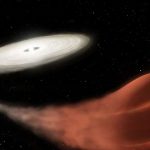NASA Selects Axiom for First Commercial Module for the International Space Station0
- From Around the Web, Space
- January 29, 2020
The module will attach itself to the ISS’ Node 2 forward port.

The module will attach itself to the ISS’ Node 2 forward port.

This isn’t how black holes are supposed to behave.

Astronomers say this planet is the hottest identified so far.

Is that…Bigfoot? Someone at the Washington State Department of Transportation certainly thinks there’s a chance.

Scientists at Department of Energy (DOE), Brookhaven National Laboratory (BNL) and Cornell University discover a new way to maximize the energy of particle accelerator making it more energy efficient and dubbing it the ‘Green’ accelerator.

The newly unveiled logo for US Space Force appears to have boldly gone where Star Trek went before.

Thousands of tonnes of radioactive materials could be used to power everything from pacemakers to spacecraft

With over 4,000 confirmed exoplanets, we’re starting to get an idea of which types are common and which are rare. We’ve learned that our solar system is rather unusual in ways you wouldn’t expect. Take, for example, the presence of large planets orbiting small stars.

NASA’s Kepler spacecraft was designed to find exoplanets by looking for stars that dim as a planet crosses the star’s face. Fortuitously, the same design makes it ideal for spotting other astronomical transients—objects that brighten or dim over time. A new search of Kepler archival data has uncovered an unusual super-outburst from a previously unknown dwarf nova. The system brightened by a factor of 1,600 over less than a day before slowly fading away.

What’s making these things fly out of the frozen continent?



